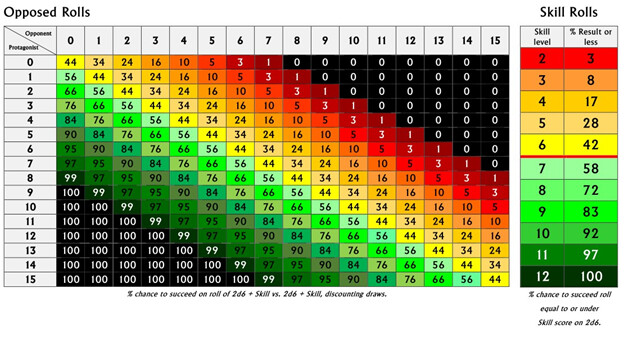Troika! (www/srd) is a gonzo sci-fi/fantasy pulp RPG from the Melsonia Arts Council built on top of the classic Fighting Fantasy system.
It’s definitely my most played game of 2020 - 2021, and I like it a lot because of how quick it is to make characters and to learn the rules and start playing, and because of the flavor and because of the community.
Pros:
-
Fast character creation: Roll 3 stats, choose/roll a background, and start playing. What’s not to like!
-
Simple rules: roll 2d6. If it’s opposed, add your skill and high role wins. If not opposed, try to roll under your skill. (Simple Rules + Fast Character Creation has allowed me to successfully run games for players new to the hobby, with only D&D experience, and a reluctance to spend the time to learn a new system.)
-
Flavor: there is no default setting, lore, or history to the world of Troika. But the backgrounds and spells are dripping with flavor and manage to create a feeling of loose cohesion in this world.
-
Community content: There is an impossible number of homebrew backgrounds and spheres (settings) on itch.io and on discord and elsewhere in the blogorhombus. Creating your own content like this is super easy, and is encouraged by the text. Technical Grimorie has compiled a ton of 3rd party backgrounds, and also created a turn tracker.
-
Bestiary: Every creature has an accompanying mien, a d6 table of dispositions that removes the possibility of every encounter leading directly to combat. Sometimes the bogart is just sullen.
Cons:
-
The initiative stack. Love it or hate it, it’s a weird way to handle initiative. Read more about it on the SRD if you want to. I usually run initiative with the stack for a new group at least once so they can experience Troika “as it is written”. But then I usually toss it out in favor of “Players act, then NPCs/monsters act”. The reason I don’t use the initiative stack that often is that I don’t trust it. One time I had a combat that improbably went three rounds and then ended without one of my players getting to go even once. Which was interesting, but not fun.
-
Rules: Although the rules are relatively simple, there is still some complexity there. Remembering to roll under (unopposed checks) or whether to roll and add your skills (opposed checks) is often simple enough after you’ve played for a while. But then spells work totally differently (Always roll under, take a penalty to stamina). There’s an alternative, minimal ruleset called Pulka! that offers a unified mechanic for all roles by turning your Advanced Skills into a dice pool. Keep all the flavor, simplify the rolling!
One final thing I’d like to discuss outside the confines of a pros vs. cons list is the perceived inherent wackiness of Troika. This is definitely a pro for some. And I’ve also seen some people be turned off by it, and dismiss the game as inappropriate for their use. I concede there is some wackiness/absurdity in the official content. But to a much, much larger extent, the tone of your game is up to you. I have a long running dystopian biker gang Troika game that is dark and moody, because that’s the kind of game we all agreed to play, and Troika does a fine job supporting it. We brought some custom backgrounds to it, as well as our own setting, and it has worked great so far.
That’s Troika. I’ve played a ton of it over the last year both as a player and a GM. It’s quick, easy, and fun. There is a plethora of free community made content out there, in addition to very high quality official published material. The SRD is freely available. I think it’s great and I love it. It continues to be my go to game for quick pickup games and for newer players.

 Especially if they are attracted to the idea that it is “old-school.”
Especially if they are attracted to the idea that it is “old-school.”
